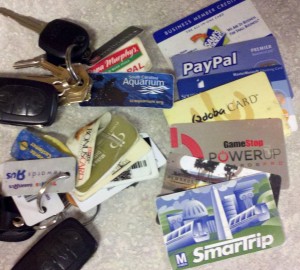 You might as well throw your wallet and your key chain into an incinerator while you are at it. The social media sites are buzzing with warnings about the new Google Privacy Policy that goes in effect on March 1, 2012. There seems to be an endless list of people who are providing instructions on how to delete browser history. What’s the big deal?
You might as well throw your wallet and your key chain into an incinerator while you are at it. The social media sites are buzzing with warnings about the new Google Privacy Policy that goes in effect on March 1, 2012. There seems to be an endless list of people who are providing instructions on how to delete browser history. What’s the big deal?
Google’s principles are not changing. They are still going to collect as much data as they can to be able to provide you with the products (ads) and services you want most. The real difference is that they are going to do this across more seamlessly across all of there services. If you have a Google account and have never logged into your Google Dashboard, then you may be in for a surprise when you see the list of servies what Google provides. Here are a few that I use: Web History, Google+, YouTube, Picasa, Analytics, Adsense, Blogger, Calendar, Docs, Gmail, Feedburner, Reader, Talk, Android Market, and Webmaster Tools. There are a dozen plus other services that don’t appear on the dashboard. A couple of them that I use are Adwords and Google Bookmarks.
The big item of concern seems to be the web or search history. I contend that if you have never disabled or turned off your search history then any perceived damage is already done. And oh by the way, even if you don;t allow Google to record your search history, there is nothing you can do to stop you employer, school, church, coffee shop, or any other place where you access the Internet. I can say that as a web site owner, I know how a majority of my web site visitors found my site. Almost all web servers collect data about a user’s visit. The log entries can tell me where you are coming from (IP Address), what operating system you are using, browser type, what site referred you. And if that site was a search engine I can tell what search terms you used to find my site. It takes some very tedious web browsing practices to avoid exposing yourself to others on the Internet.
As an example, a few years ago I found some updates to an article on Wikipedia that were basically character assassination on a friend of mine. Some “contributors” to Wikipedia had written some nasty things about my friend in a Wikipedia article and they were trying to hide behind pseudo names. It just so happens that Wikipedia collects IP Address information for every user who edits an article on their site. I noticed that one of the IP Addresses matched an IP address for a frequent visitor to more than one of my blogs. It may sound weird, but I am more likely to remember you phone number or IP address than your name. This visitor had also left comments on my blog posts and my WordPress installation had also recorded their IP Address along with their web site URL and email address. I called them out by name on Wikipedia, and got a warning for violating Wikipedia guidelines for ding so. At least I got me make my point and my notes are in the update history for that article. Anyway, eventually the husband of one lady emailed me add asked me to stop using his wife’s name for security reasons. He said that she had been the victim of a stalker and wanted to reamin anonymous behind here pseudo name. However, as I pointed out to him, she did not go through the trouble to make her domain registration information private so his argument did not hold water. Her domain registration still to this day contains her full name, street address, and phone number even though I pointed this out to her husband. Obviously he was not too concerned about her safety from stalkers, but was more concerned about me shining a light into the dimly lite corner where she was spewing lies, hate and discontent towards my friend.
I shared this story to make the point that you are leaving bread crumbs all over the Internet and your Google Search History is just one small piece. I encourage you to read the new privacy polices and make up your own mind. Don’t simply give in to the fear mongering. As for me, I will not be deleting or disabling anything. I like it when my waitress knows me well enough to know what I drink. I like it when my pharmacy and grocery stores print off coupons that I can actually use. And I like it when my search engine knows me well enough to give me what I am looking for without me having to yell or draw color pictures using crayons.










